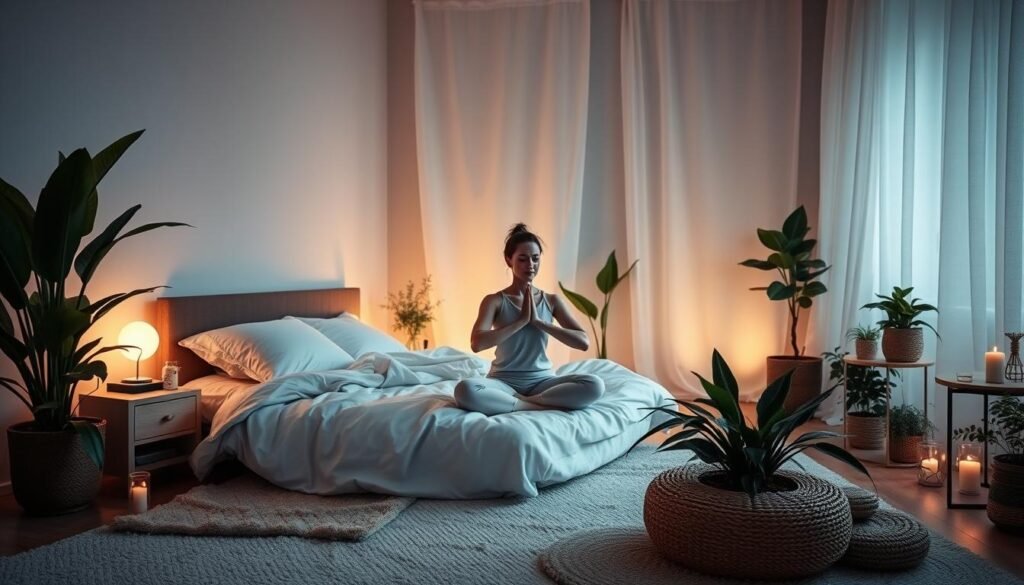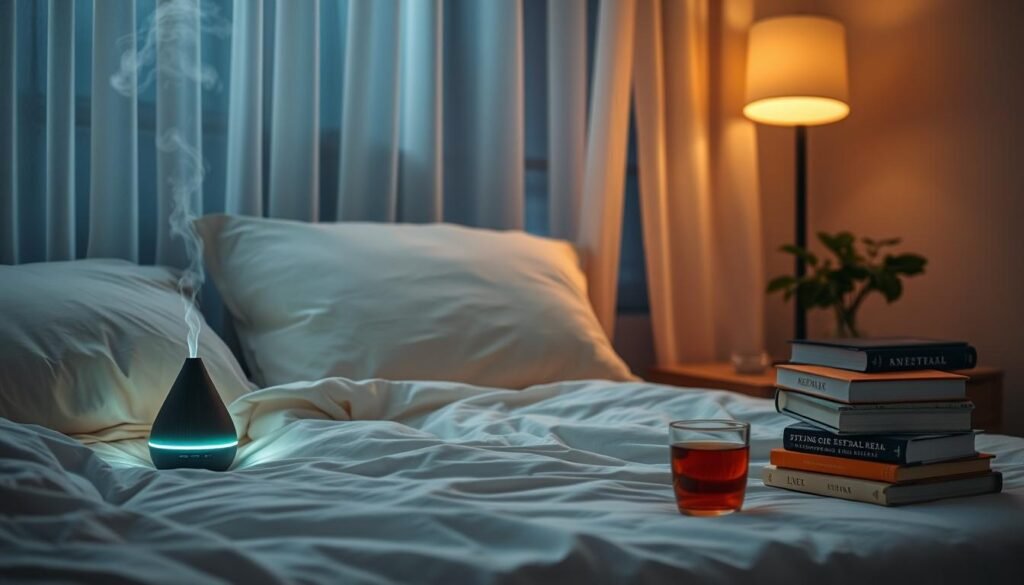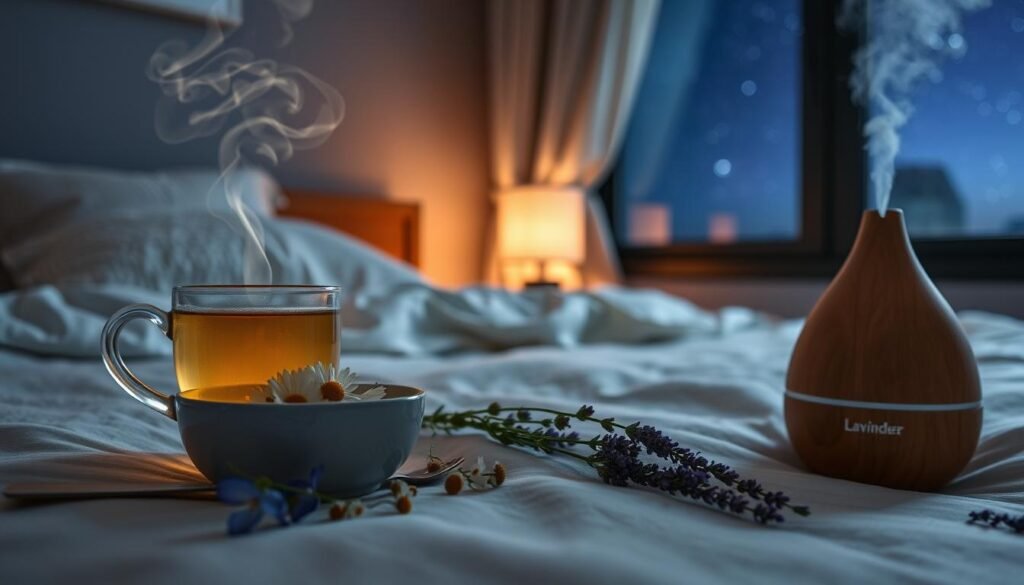Did you know that nearly one in three adults can’t sleep well at some point? This problem can really affect your energy, mood, and daily life. People suffering from insomnia with bipolar 2 have even more trouble because their sleep problems are linked with mood swings. It’s important to work on sleeping well not just for rest, but to feel emotionally stable and mentally healthy.
The need to tackle insomnia is huge. If not handled, it could lead to heart disease, diabetes, or even cancer. Also, emotions like stress and anxiety are behind half of all insomnia cases. It’s key to find good ways to manage sleep that aren’t just about taking pills or medications.
There are many steps to take to sleep better, from changing behaviors to fixing your sleep space. Making your room calm and learning how to relax are big steps in fighting insomnia. This article will cover helpful tips, showing how important it is to approach sleep issues fully, especially for those dealing with bipolar disorder.
Key Takeaways
- Insomnia affects nearly one in three adults, highlighting its prevalence and impact.
- Chronic insomnia can lead to severe health issues, making its management vital.
- Emotional factors, such as stress and anxiety, often contribute to insomnia experiences.
- Creating a sleep-friendly environment can significantly improve sleep quality.
- Integration of relaxation techniques and consistent sleep hygiene are essential for effective sleep management.
- Understanding the connection between insomnia and underlying health conditions underlines its importance.
- Explore more insights and personal experiences to enhance your approach to overcoming insomnia at BPHope.
Understanding Insomnia and Its Impact
Insomnia is a common sleep disorder that greatly disrupts daily life and health. Around one in five Americans deal with chronic insomnia. This condition leads to trouble falling asleep, staying asleep, or waking up too early.
The impact of insomnia on health is significant. It often causes mood swings, lowers productivity, and creates cognitive issues.
Chronic insomnia can lead to serious health problems like anxiety, heart disease, and diabetes. It’s crucial to understand its effects on both physical and emotional well-being. People with chronic insomnia struggle with concentration, decision-making, and managing stress. Restorative sleep is key for mental and physical health, and missing out on it increases risk for accidents.
Insomnia includes sleep onset insomnia and sleep maintenance insomnia. The first makes falling asleep hard, while the second means waking up often. These conditions add to the burden of sleep disorders affecting many. Addressing these issues is important as restorative sleep benefits everyone.
| Type of Insomnia | Symptoms | Potential Health Impact |
|---|---|---|
| Sleep Onset Insomnia | Difficulty falling asleep | Increased anxiety, difficulty with concentration |
| Sleep Maintenance Insomnia | Frequent awakenings, waking too early | Chronic fatigue, heightened risk of mood disorders |
| Chronic Insomnia | Can include both sleep onset and maintenance issues | Severe health risks, including heart disease and diabetes |
The Connection Between Mood Disorders and Sleep
The link between sleep and mood disorders is complex. Anxiety can disturb sleep, making both worse. Depressive episodes change sleep patterns, affecting well-being. It’s key to treat mood disorders to improve sleep.
How Anxiety Disorders Affect Sleep Quality
Anxiety leads to high alertness, making relaxation hard. This lowers sleep quality. Problems with falling or staying asleep can increase anxiety, forming a vicious cycle. Addressing anxiety helps better sleep, studies show.
Depressive Episodes and Their Effect on Sleep Patterns
Depression affects how we sleep, causing insomnia or over-sleeping. People with depression may find it hard to sleep well at all. This poor sleep can make mood worse, hindering recovery from depression.
| Condition | Typical Sleep Impact | Common Treatments |
|---|---|---|
| Anxiety Disorders | Hyperarousal leading to insomnia | Cognitive-behavioral therapy, medication |
| Depressive Episodes | Insomnia or hypersomnia | Therapy, lifestyle changes, medication |
| Bipolar Disorder | Irregular sleep patterns, insomnia | Medication, behavioral interventions |
insomnia bipolar 2: What You Need to Know
People with bipolar disorder often have trouble sleeping, especially with insomnia bipolar 2. This problem changes sleep patterns, particularly during mood swings. Many with bipolar II disorder face long sleep times and wake up often. This makes managing their sleep difficult. It’s key to spot biphasic sleep patterns to get why sleep quality changes.
About 25 to 65 percent of those with bipolar disorder face sleep issues before a manic episode. Insomnia cuts down on sleep, which can start manic and hypomanic phases. Early studies show fixing sleep/wake cycles may help those with hard-to-treat rapid cycling bipolar disorder.
Research links poor sleep to brain changes, showing how closely sleep and bipolar disorder are connected. Having good sleep habits is crucial. This means going to bed at the same time each night and keeping the bedroom for sleep and intimacy only. Getting family help in keeping a sleep schedule can stop mood swings and make things more stable.
Cognitive behavioral therapy for insomnia works well, changing bad thoughts into better sleep habits. Using a sleep diary helps identify what disturbs sleep. With the right approaches, dealing with bipolar-related sleep problems gets easier. This leads to better mood control and well-being. For more, check the study on sleep disturbances in bipolar.
Effective Techniques to Combat Insomnia
Combatting insomnia means using methods that make you relaxed and help you sleep better. Techniques like controlled breathing can lower stress. This makes it easier to fall into deep sleep. They don’t just help you fall asleep; they keep you sleeping well all night. Regular practice improves your sleep over time. This means more restful nights.
Controlled Breathing and Relaxation Exercises
Controlled breathing is great for beating insomnia. It calms your mind and helps you start sleeping. Here’s a simple way to do it:
- Find a comfortable position, whether lying down or sitting.
- Inhale slowly through the nose for a count of four.
- Hold your breath for a count of seven.
- Exhale gently through the mouth for a count of eight.
- Repeat this cycle three to four times.
Adding relaxation exercises makes controlled breathing even better. Focus on being aware of your body and relaxing your muscles. This full approach is key for fighting insomnia.
Progressive Muscle Relaxation Techniques
Progressive muscle relaxation also helps with insomnia. It involves tensing and relaxing muscles to shed stress. Here’s a way to do it:
- Begin with your toes; tense the muscles for five seconds, then release and relax.
- Move to your feet, tense for five seconds, then relax.
- Work through your legs, abdomen, arms, shoulders, neck, and face. Tense and relax each part.
Using muscle relaxation helps you find and ease tension. Doing these techniques often can improve how well you sleep and your mental health.

| Technique | Description | Benefits |
|---|---|---|
| Controlled Breathing | Slowly inhale, hold, and exhale to calm the mind. | Reduces anxiety, helps in falling asleep. |
| Progressive Muscle Relaxation | Tense and relax muscle groups sequentially. | Alleviates physical tension, promotes relaxation. |
Creating a Sleep-Friendly Environment
It’s key to have an environment that’s good for sleep. Things like noise, light, and temperature affect our sleep quality. Using items like sound machines helps block out noise. This helps your mind relax and get ready for sleep.
Keeping the room dark is also vital. Blackout curtains help block outside light, making it easier to relax. This tells your body it’s time to sleep. Experts say this is crucial for good sleep.
How warm or cool your room is matters a lot for sleep. A cool room, around 60-67 degrees Fahrenheit, is best for most people. Using breathable bedding and keeping the air flowing are also important.
A clean room helps reduce distractions. A neat space tells your brain that it’s time to sleep. Choosing calming decorations and keeping things organized can make your room more peaceful.
Making these changes can make a big difference in how well you sleep. Reducing distractions and creating a calm setting are key. Focusing on these aspects can help improve your sleep and mental health.
| Factor | Optimal Practices | Impact on Sleep |
|---|---|---|
| Noise | Use sound machines | Promotes relaxation |
| Light | Install blackout curtains | Encourages melatonin production |
| Temperature | Maintain 60-67°F | Enhances comfort |
| Clutter | Keep space tidy | Minimizes distractions |
| Bedding | Use breathable materials | Improves sleep quality |
Establishing Sleep Hygiene Habits
Sleep hygiene is vital for restful sleep and overall health. Good habits can boost sleep quality, especially if you have insomnia or mood issues. Making a regular sleep schedule and limiting device use at night leads to better sleep.
The Importance of a Consistent Sleep Schedule
Keeping a steady sleep schedule is key. Sleeping and waking up at the same times every day helps set your body’s clock. This can improve sleep hygiene and lessen insomnia risks.
Irregular sleep can worsen mood swings in people with bipolar disorder. A regular bedtime routine is crucial. It could include activities like reading or meditating. Keeping naps short and not napping some days also helps.
Reducing Screen Time Before Bed
Cutting down screen time at night is crucial for sleep hygiene. Screens emit blue light, which can disrupt melatonin production. Having a digital curfew, ideally an hour before bed, helps your brain relax.
Try non-digital activities like listening to calm music or relaxation techniques. A sleep-friendly environment, without distractions, tells your brain it’s time to rest.

Coping with Circadian Rhythm Disruption
Circadian rhythm problems greatly affect sleep, especially in those with mood disorders like bipolar disorder. It is key to understand our biological clock to manage these rhythms well. If these natural cycles are disrupted, it can lead to sleeping issues and impact mental health.
Understanding Circadian Rhythms and Sleep Patterns
Circadian rhythms are internal clocks that control our sleep-wake cycle over 24 hours. They are essential for good sleep, impacting mood, energy, and health. About 70% of people with bipolar disorder have trouble sleeping, showing the link between circadian problems and sleep issues.
Managing circadian rhythms can be done by:
- Getting sunlight in the day to help our biological clock.
- Keeping a regular sleep schedule for better sleep quality.
- Planning daily tasks to match our body’s natural rhythms.
- Using methods like interpersonal and social rhythm therapy (IPSRT) to keep a steady routine and social life.
Studies show IPSRT and similar therapies can normalize sleep patterns. This helps lessen bipolar disorder symptoms. Circadian instability may make mood disorders worse. This shows the importance of therapy focused on routine and sleep stability.
To ease insomnia, understanding and managing circadian rhythms is crucial. Setting a stable biological clock not only improves sleep but also boosts emotional well-being and life satisfaction.
Natural Remedies and Supplements for Sleep
Struggling with insomnia? Natural remedies for sleep can help. Herbal teas and dietary supplements can promote relaxation and better sleep. By using these remedies at night, you might find it easier to fall asleep and enjoy restful sleep.
Benefits of Herbal Teas in Promoting Sleep
Herbal teas are great for relaxing in the evening. Chamomile tea is especially calming, making it a top choice for natural sleep aid. Lavender and passionflower teas also help by reducing anxiety and improving sleep. Adding these herbal teas to your bedtime routine can create a peaceful environment for sleep.
| Herbal Tea | Primary Benefit | Recommended Usage |
|---|---|---|
| Chamomile Tea | Calming and sedative effects | 1-2 cups before bedtime |
| Lavender Tea | Reduces sleep disturbances | 1 cup before bed |
| Passionflower Tea | Improves sleep quality | 1-2 cups before bedtime |
The Role of Melatonin in Regulating Sleep
Melatonin helps regulate our sleep cycles. It’s shown that taking 3–10 mg can improve sleep, especially for jet lag or shift work. Even small doses, like 0.1 to 0.3 milligrams, can be enough. Magnesium also helps, making it easier to fall asleep.
When using melatonin supplements, knowing the right dose and when to take it is key. But be cautious. Herbal products and supplements aren’t tightly regulated. Being careful can minimize risks and improve your experience with natural sleep remedies. For more info on botanical medicines, check out this resource.

When to Seek Professional Help
Knowing when to seek professional help for insomnia is vital for health and well-being. Chronic sleep issues call for experienced sleep specialists’ advice. It matters how severe and long-lasting sleep disturbances are.
Consistent insomnia for three weeks or more might mean there are deeper issues. Physical and mental health problems or lifestyle habits could be causing sleep issues. Sleep specialists help by giving a clear picture and treatment options.
There are signs that show it’s time for professional help:
- Feeling very tired during the day, affecting what you do
- Finding it hard to concentrate or stay focused
- Sleep problems causing anxiety or depression
- Existing health issues getting worse
- Problems with relationships or at work
Talking to a sleep specialist involves a deep assessment, including sleep studies. They tailor treatment options to meet individual needs. They can talk about therapies or medicines and offer ongoing help.
To wrap it up, knowing when to get professional help for insomnia leads to better sleep and life quality. Acting early often brings better outcomes. It’s key to spot the signs and act on them.
Conclusion
In summary, managing insomnia shows how sleep and mental health are connected. This is especially true for people with bipolar disorders. Sleep problems are common and can signal upcoming mood changes. Over half of those with bipolar disorder experience this. Understanding these issues helps improve sleep quality.
Making lifestyle changes is key for better sleep. This includes things like improving your sleep space and habits. Techniques to relax and seeking help if needed offer hope for those struggling to sleep. These efforts can greatly improve sleep quality and overall happiness.
Seeing sleep as crucial for health is the first step. Taking action allows people to enjoy restful nights once more. Awareness, effort, and support make better sleep possible. It’s clear that achieving restful sleep is within reach with the right steps.